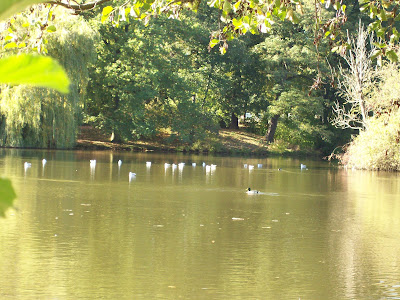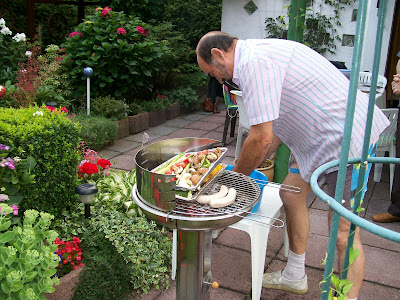 Join me for a fresh espresso and a praline of your choice - over 250 to choose from...
Join me for a fresh espresso and a praline of your choice - over 250 to choose from... Or would you rather read the Munich paper with me and have a cup of coffee in the Biergarten at the Glashaus...
Or would you rather read the Munich paper with me and have a cup of coffee in the Biergarten at the Glashaus... Okay, we talk over espresso, and you see this backdrop...
Okay, we talk over espresso, and you see this backdrop...
This is not really about coffee drinks but rather a topic on my mind for years.
Many things motivated Europeans to leave the "old world" for the new. Among them was the idea - born of the Enlightenment but not new - that "all humans are created equal". This is no new idea. In the New Testament Paul quotes the Old Testament, saying"God is no respector of persons...". Literally from the Hebrew, God does not stand there as an ancient Asian Despot, before whom all must bow their faces and touch the ground with their foreheads, after which the despot allows some to raise their head, while others must remain bowed. Not so with the real ruler of all: he gives no special advantages to anyone.
This is truly still a radical thought: no color of skin, no academic or royal title, no professional or theological or church achievement, no amount of money or appearance gives any of us an advantage over others.
We all share in the same human predicament: saved by grace but still subjected to the human shortcomings, among which the greatest are the lust for power and money.
The founding fathers of the United States were well aware of these shortcomings - they built protective measures into the Constitution to assure that no one interest group would have the opportunity to take advantage of others. These are referred to as checks and balances. Behind this was the wish - the prerequisite - that knowledge must flow freely and in all directions in a group that preserves the equality of all humans.
Perhaps you are already thinking with me. "Knowledge is power" said an ancient Greek philosopher, especially when I know something you don't know, and you don't even know that I know it. Not only does this address the serious responsibility of journalists. It also alerts us to how easy it is create an imbalance of power and influence, which often results in unfair advantages to one group over other groups, which can sway the hearts and minds of others unfairly. We sometimes call this propaganda, sometimes coercion, sometimes downright deception.
While we may shake our heads when we see this on the political front of various nations, it is even more revolting to experience this in a group that would quote Paul before it would cite the US Constitution. Those who would uphold the unity we all have in Christ - the sameness and equality of all believers - can then also deliberately establish approved avenues of procedure to intentionally hold knowledge from those who they, as leaders, have been called to care for.
Earlier times saw the condemnation of translations of the Bible or banning teaching except from approved persons or institutions. The Roman Catholic faith presents another variant: divine sanction as the wild card. If you need a justification for your special priviledges with knowledge (and, thus, power), you simply need a direct mandate from God. According to this, the directives of the church leadership are also from God himself. And the King was also ruler by God's grace, so you had better obey the King and not question his power.
Yet Protestant secular leaders and free church leaders still aspire to such divine mandates. "I believe God has called me to be......" . You fill in the blank: governor, preacher, president, bishop, whatever. if God has called you, then who dare question your authority?
But, aren't all humans created equal? Paul said that, and he was certainly called by God. But how intoxicating can power be..... as the current world stage shows. Checks and balances serve us well, as we all correct each other and hold each other in check and balance, when we realize our equality. Yet leaders - individuals and groups, political and church - can hire and fire, pro- and demote church workers stateside and abroad using their monopoly on power and knowledge to stage pro forma meetings, any kind of "discussion" forum, even though their decisions were already made well in advance. Numerous cases in US current events come to mind. Indeed, this very writer has experienced first hand in the religious arena the detesting hypocrysy of being duped into staged situations in which the real matter to be decided was the power and reputation of others, and this writer's fate played only an ancillary role.
What am I learning from this? How tragic it is when someone or some group claims others have nothing to tell them, or they refuse to communicate openly to others. And, in any decision-making forum, I always look for the checks and balances. Does the leadership communicate openly? That is, does the leadership engage in true open discussions, and not simply impart information to others? Too often have I experienced staged meetings, in which leadership simply made announcements or probed the participants for information while revealing nothing about their thoughts.
I am thankful for the more critical journalism here in Europe and for the lessons that have been learned from totalitarian goverments restricting knowledge and power. But the danger of falling back never abates. Yes, even literary theory helps us, as semiotics and deconstruction help us to uncover the power structures so deeply assumed in the narratives we read and promulgate in our daily lives. Critical reading and discussing are essential, yet who takes the time for that nowadays?
If you have read with me, I hope your espresso kept you alert.... and thank you for your attention.
 The Leipzig Cotton Manufactur - a historic building
The Leipzig Cotton Manufactur - a historic building A view of the St. Thomas Church from Café Luise, one of my favorite places. Here I am sitting outside drinking coffee and enjoying this view.
A view of the St. Thomas Church from Café Luise, one of my favorite places. Here I am sitting outside drinking coffee and enjoying this view.  The clock tower of the old city hall, from the 15th century
The clock tower of the old city hall, from the 15th century The Grimmaische Straße - one of the oldest streets in Leipzig.
The Grimmaische Straße - one of the oldest streets in Leipzig.  The Messehofpassage - trade fair passage - seen from Café Darboven.
The Messehofpassage - trade fair passage - seen from Café Darboven.  A restored department store building - housing Karstadt now.
A restored department store building - housing Karstadt now.  The contrast of old and new in downtown Leipzig
The contrast of old and new in downtown Leipzig The Passage in Speckshof - the inner court of the Speck building.
The Passage in Speckshof - the inner court of the Speck building. 



















